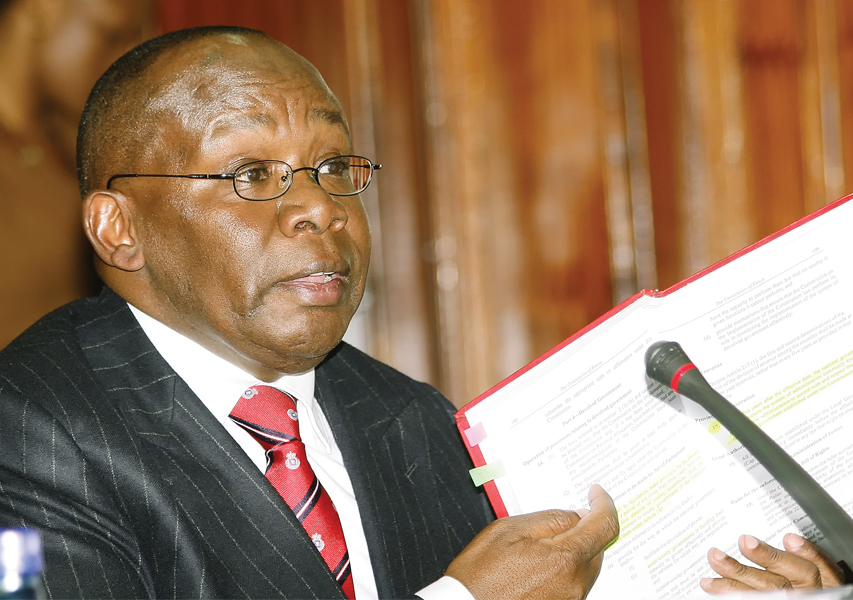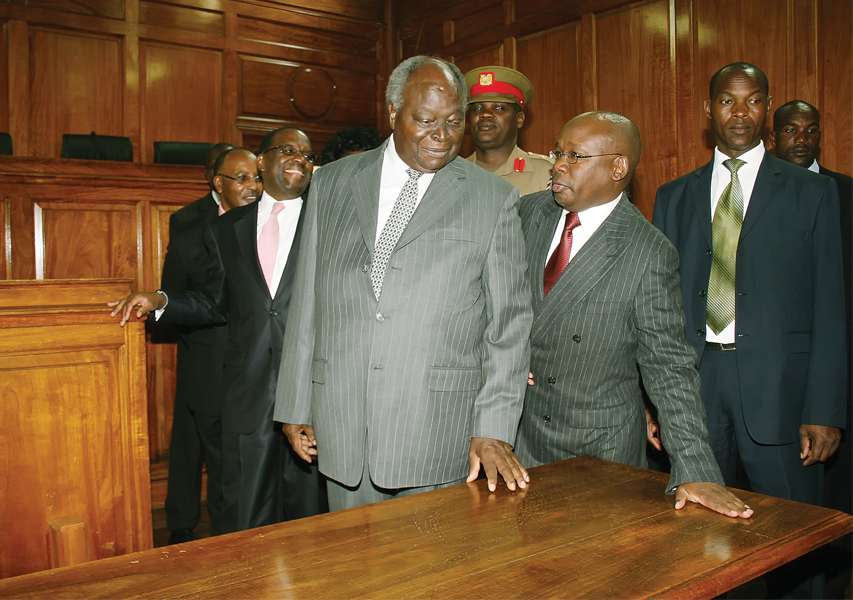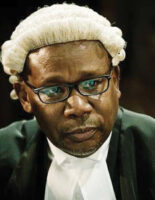
Muigai is a founding partner at one of the most successful indigenous law practices in Kenya, Mohammed Muigai LLP, where his prowess was undisputed. His legal scholarship, already well developed at graduation from the University of Nairobi in 1983, was solidified at Columbia Law School where he earned his Master’s in Law. Upon returning to Kenya, he taught at his alma mater and grew his legal practice, rapidly establishing himself as an authoritative scholar, consultant and practitioner.
As his professional stature rose to commanding heights, Muigai found himself inexorably drawn to public affairs locally and globally. In 2000, he was selected to the Constitution of Kenya Review Commission (CKRC), a panel of eminent (mainly legal) scholars and intellectuals tasked with delivering Kenya’s first serious attempt at a fundamental constitutional overhaul. Undiminished in the company of colossal luminaries, Muigai made his mark, distinguishing himself as a patient, incisive and effective dissector of delicate and controversial issues.
After his appointment to CKRC, he went on to earn a PhD in Law in November 2002. In 2008 he was appointed a United Nations’ Special Rapporteur on Contemporary Forms of Racism, Xenophobia, Racial Discrimination and Related Forms of Intolerance. Muigai also served a term as a judge of the East Africa Court of Justice between 2008 and 2010.
He entered government, therefore, as a celebrated and accomplished professional, more than suited for the office of Attorney General. Indeed, he took over his new job with relish, continuing the work of transitioning the country into the new constitutional dispensation through conscientious stewardship of the evolving statutory and policy framework. As a captivating public orator, he was also much in demand as a speaker, panellist and rapporteur for professional gatherings across many sectors.
Believing that example and teaching are effective means of influencing organisational culture and developing institutional leaders, Muigai brought a law firm approach to case management at the State Law Office, treating counsels as partners or associates, depending on their seniority. He convened and led regular strategy meetings to develop plans for approaching various tasks such as negotiations for treaties, litigation in court and legislative drafting.
The previously impersonal bureaucratic approach to case management had led to lethargy, disengagement and disillusionment among counsels, creating fertile ground for indolent, negligent and often corrupt (mis)management of cases. According to Muigai, these were classic signs of disengagement resulting from low to absent motivation and an unsupportive, if not toxic, workplace. Lawyers in private practice took lethargy at the State Law Office as a given and saw opportunities to strike big wins with little or no resistance.
The impact on the public purse was tremendous, and national interests suffered immensely. Parliament and the Auditor General frequently lamented about negligent collusion costing the exchequer billions of shillings in much-needed public funds, and the country became used to revelations of unsuitable contracts and agreements binding the State to expensive, illegal arrangements. Likewise, the country’s management of remedial litigation – when a beneficiary to such contracts sought to extract their pound of flesh, or when Kenya decided to terminate the improvident arrangements altogether – was uninspired, lethargic to the point of collusion, incoherent to the point of sabotage and uncoordinated to the point of negligence.
The number of high-profile cases lost by Kenya to shadowy entities in pursuit of questionable gain, locally and abroad, is large. Although the Goldenberg and Anglo-Leasing scandals were the high water mark of institutionalised corruption aided and abetted by commission and omission from the State Law Office, they were by no means exceptional. The public, civil society, Parliament, commissions of inquiry, investigative agencies and international partners had long become accused to the torrential succession of sordid conspiracies that could have been forestalled through diligence, vigilance and professionalism at the Attorney General’s Chambers.
Everyone was therefore quite surprised by the charge of battling troops who livened up proceedings and raised the standard of performance in and out of court when Muigai took over as AG. His management approach accompanied deeper reforms to make Sheria House – which houses the State Law Office and the Attorney General’s Chambers – the hub of efficient service delivery in keeping with the AG’s position as the titular head of the Bar, chief legal adviser of government and provider of a wide range of public legal services.
Sheria House has always been an understated institution. Its importance to the institutional health and integrity of the country is not widely acknowledged. Certainly, it is not politically constructed as indispensable the way, for example, internal security is. Yet Sheria House is where the Public Trustee, and the registrar handling companies, societies and marriages, counsels handling litigation, treaties and agreements, and legislative drafting are domiciled.
Intestate succession, bankruptcy, liquidation, cooperatives, clubs, trusts and civil nuptials are some of the critical functions handled at Sheria House on behalf of the government and its citizens, to facilitate the smooth functioning of State, society and its engine, the economy. These functions exist alongside advising and representing the government in all legal matters

Leading by example, Muigai inspired many Kenyans, especially practising and aspiring lawyers, by personally appearing in court to argue cases at the High Court, Court of Appeal and Supreme Court. In particular, his meticulous presentation, parsimonious sparring and rhetorical flamboyance were impressive. As a veteran of the Kenyan Bar, his successful forays into courtroom drama elevated him to the venerated realm of doyens of his profession.
In international litigation, Kenya’s stature was elevated by Muigai’s intellectual authority, courtroom fluency and eloquent persuasion as he represented the country before international courts and tribunals regionally and farther abroad.
Boldly departing from a practice of hiring international lawyers to represent Kenya, the AG established a practice of assigning the work in-house. He generously shared the spotlight with his counsels and empowered them to grow and enrich their international law practice.
Another unique legacy of Muigai at the State Law Office is the appointment of states counsel to take charge of corporations as CEOs and serve on boards. This strategy was a bold signal that the Attorney General’s Chambers had ample space for career growth.
Muigai strived to strike a balance between his technocratic and managerial imperatives, and the need to surmount political tides whose continuous flux rocked his ship within and without. Freeing his chambers from the captivity of collusive tendencies with outside players both in the public and private sectors was always going to be challenging.
Influential actors had substantial interests in the favourable (mis)management of cases at the chambers. Pressure, inducement and bribery were deployed to compromise officers at various levels. Powerful offices in government were likewise enlisted to procure advantageous concessions out of the AG’s Chambers. These entities stood to gain stupendously out of such collusions and were therefore willing to invest all the effort necessary to have their way. Already, many had made a killing out of such behaviour and had resources at their disposal to buy their way.
Managing politics and reforming institutions inevitably entails coming to grips with corruption. So entrenched is corruption in the public sector that it is basically institutionalised. Any reform attempt must therefore carefully tip-toe around the interests of powerful cartels. As former Permanent Secretary John Githongo famously said, corruption fights back. Muigai’s salutary interventions at Sheria House ran directly into the way of these cartels. Predictably, they responded harshly through their myriad tentacles in government and politics. For a man who had endured public vetting, Muigai’s sudden political challenges were mystifying.
Appeasing the gods of politics can be a full-time occupation for public managers. Managing internal dynamics of a sprawling and influential organisation can be equally taxing. Add to this the spectral hand of virtually omnipotent and amorphous interests who bestride all boundaries between local and international, public and private, political and business, legitimate and illicit activities, and the task is fundamentally Sisyphean.
A point came, therefore, where astute political management went hand in glove with appeasing corruption cartels, and choices had to be made. For Muigai, this was antithetical with his reform agenda and the project of restoring the State Law Office as the lynchpin of integrity in the administration of the public’s legal interests. His ethical inflexibility and inability to innovate interpretation and application of the law to accommodate grey areas began to irritate, then antagonise impatient and formidable actors.
Ever the juggler, he braved on, empowering his partners, associates and pupils at his firm to become effective advocates for the State and government of the Republic of Kenya. In the era of implementation of the new Constitution, the State Law Office began to acquire the image of a modern, responsive, effective and accountable institution. The registries were digitised, and the tradition of missing files was finally retired. Kenyans could now find information on matters recorded at Sheria House online.
States counsel began to give private advocates a run for their money and internationally, Kenya’s legal cases turned out in Kenya’s favour in unprecedented numbers. The rule of law, integrity, efficiency, transparency and accountability stopped being the exclusive vocabulary of civil society activists and the Anti-Corruption Commission as State lawyers embraced and zealously advocated them as well.
Although Muigai applied himself to the mastery of the technocratic imperative of balancing management and appeasing political interests, it did not come easy to him, and it showed. Institutional politics is just politics, and requires the performance of certain rituals to get on the right side of various operatives in order to grease the wheels of progress and service delivery. The optics of glad-handing and elaborate and public pledges of fealty contradicted his sense of professorial dignity.
Add to all this the fact that Muigai was literally a stranger in the State Law Office and government. All the AGs since independence had been Alliance High School old boys, as had been many solicitors general. They also tended strongly to the pedigree of the typical independence era elites. His significantly different background meant that Muigai shattered this archetype. His genteel mannerism and turn of phrase belied a scrappier, battling drive that had stood him in good stead on an alternative academic and career path, which converged with the beaten track only at the university. With this came a certain independence and ability to retain a disinterested posture and scholarly abstraction within institutions deeply embedded in long-standing networks of reciprocity. Unlike his predecessors, he did not possess the inclination to conduct politics in the elite networks along several strands.
This independence often manifested in awkward ‘body language’ but also earned him grudging respect, for it was felt that he could stand his ground whenever the Executive desired to exceed its constitutional and statutory constraints. Yet because he could not vocally contradict or criticise government, his reticence ended up being criticised as complicit awkwardness rather than principled hesitancy.
The transitional provisions of the constitutions required government to pass a raft of legislations for the implementation of the new dispensation, work that commenced with Wako and was ongoing when Muigai was appointed. The Executive and its bureaucracy, faced with onslaughts that chipped away its immense power, began to react. Legislative proposals started to carry provisions whose effect was to consolidate a powerful Executive and claw back on the freedoms of the Bill of Rights, as well as the separation of power. A broad coalition of stakeholders mobilised to resist these changes, and government was widely criticised as retrogressive. In the eye of this storm was Muigai, who was then viewed as doing nothing to reassure concerned stakeholders.
This criticism spilled through to allegations of extra-judicial excesses in the security system, widespread corruption in the heart of the Executive and perceived impunity and human rights abuses. Muigai was ultimately unable to satisfy critics that he was doing anything near enough to call government to order and entrench the Constitution.
The bitterly contested 2017 presidential election led to ill-tempered litigation before the Supreme Court. The petitioner, Raila Odinga, who had come quite close to winning the contest, alleged fraud, malpractice and other irregularities in his bid to nullify Uhuru Kenyatta’s victory. Several government institutions were implicated, and Muigai appeared on their behalf, conducting a blistering, masterful rebuttal of Odinga’s allegations.
Odinga’s petition was dismissed, to the disappointment of nearly half of the country’s voters and a tremendous coalition of interest groups who were traditionally allied to Odinga’s politics. Coupled with his political insularity, this blistering onslaught from vociferous antagonists assaulted Muigai’s position intensely. A moment of triumph and vindication instead opened doors to the opening act of an uneasy and long drawn out conclusion of his tour of duty as Kenya’s Attorney General.
